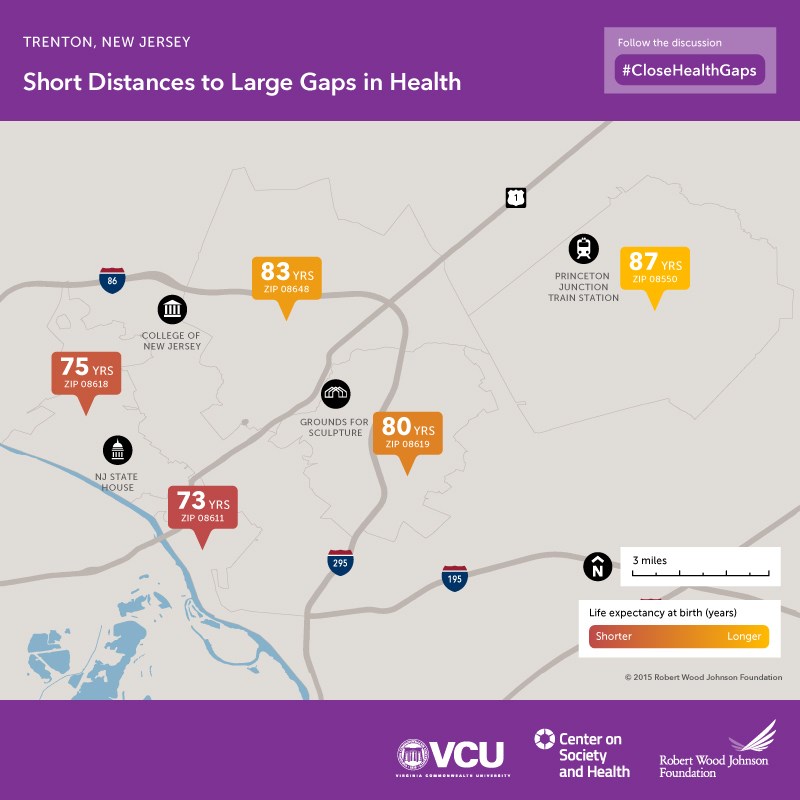A Trenton-area life expectancy map released today by researchers at the Virginia Commonwealth University (VCU) Center on Society and Health and the Robert Wood Johnson Foundation (RWJF) illustrates that opportunities to lead a long and healthy life can vary dramatically by neighborhood. In fact, if you travel about 10 miles along Route 1 from the Princeton Junction Train Station (ZIP code 08550) to just south of the Trenton Station (ZIP code 08611), life expectancy can differ by as much as 14 years (access additional life expectancy data in and around Trenton here).
Health differences between neighborhoods are rarely due to a single cause, according to this and countless other studies. A growing body of research shows that a complex web of factors influence health — poverty, environmental factors, opportunities for education and jobs, safe and affordable housing, availability of nutritious food and places for physical activity, and access to health care, child care, and social services.
“The health differences shown in these maps aren’t unique to one area. We see them in big cities, small towns, and rural areas across America,” said Derek Chapman, PhD, associate director for research, VCU Center on Society and Health.
The map is the latest in a series developed to raise public awareness of the many factors that shape health, particularly social and economic factors. Local officials and community organizations can use the map as a “conversation starter,” to raise awareness of the fact that there is more to health than merely caring for people when they are sick and that improving health requires a broad range of strategies and community voices at the table.
“To build a Culture of Health we must build a society where everyone, no matter where they live, the color of their skin, their financial or family situation, has the opportunity to lead a productive, healthy life,” said RWJF President and CEO Risa Lavizzo-Mourey, MD. “There’s no one-size-fits-all solution. Each community must chart its own course, and every person has a role to play in achieving better health in their homes, their communities, their schools and their workplaces.”
Several efforts are underway in the Greater Trenton area to tackle the many factors that shape health, including:
- Trenton Mayor Eric E. Jackson implemented “Health in All Policies” (HiAP) with department directors; Rutgers’ New Jersey Health Impact Collaborative provided HiAP training to increase understanding of the health impacts of policy and planning decisions. Additionally, the TRENTON250 Master Plan focuses on economic development, housing, land use, circulation, environment, and education—all of which impact health—in addition to a specific health focus.
- Since first coming together in 2006, the Trenton Health Team comprises more than 50 municipal, county and state agencies, social service groups, the faith community, higher education, all of the city’s major health care providers, and others with the goal of addressing health by looking at residents’ health needs, from housing to safety to access to healthy food and health care services.
- Isles, an organization dedicated to fostering self-reliant families, continues its efforts by providing GED, vocational, and life skills education, as well as supporting over 700 gardeners at 65 community and school gardens, yielding tens of thousands of produce a year.
- The Greenwood Ave. Farmers’ Market provides residents with access to New Jersey fresh fruits and vegetables, tropical fruits, eggs and baked goods. The Farmers’ Market also offers health screenings, physical activities, nutrition education, tasting demonstrations, socialization and live music.
VCU and RWJF have recently released maps for Philadelphia, as well as Atlanta, Chicago, Cleveland, Denver, the Inland Northwest (Eastern Washington/Western Idaho), Las Vegas, Miami, Mississippi, New York City, Phoenix, Richmond, Raleigh/Eastern North Carolina and Tulsa. The RWJF Commission to Build a Healthier America released similar maps prepared by VCU for Washington, DC, New Orleans, Kansas City, Minneapolis, and the San Joaquin Valley in California in 2013. In the coming months, additional maps will be released for cities and rural areas across the country. View the maps at societyhealth.vcu.edu/maps. Follow the discussion on Twitter at #CloseHealthGaps.
The Robert Wood Johnson Foundation is the largest private foundation in New Jersey and has worked for more than 40 years to improve health and health care. We are working with others to build a national Culture of Health enabling everyone in America to live longer, healthier lives. RWJF has invested more than $900 million in New Jersey since 1972. For more information, visit www.rwjf.org/nj. Follow the Foundation on Twitter at rwjf.org/twitter or on Facebook at rwjf.org/facebook.
The Virginia Commonwealth University (VCU) Center on Society and Health is an academic research center that studies the health implications of social factors— such as education, income, neighborhood and community environmental conditions, and public policy. Its mission is to answer relevant questions that can “move the needle” to improve the health of Americans. We present our work in formats and venues that are useful to decision-makers and change agents. The Center pursues these goals through collaboration with scholars in different disciplines at VCU and other institutions, and by nurturing partnerships with community, government, and private-sector stakeholder.





